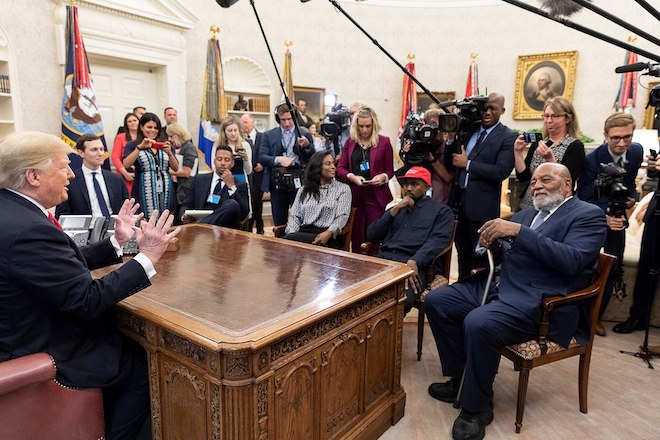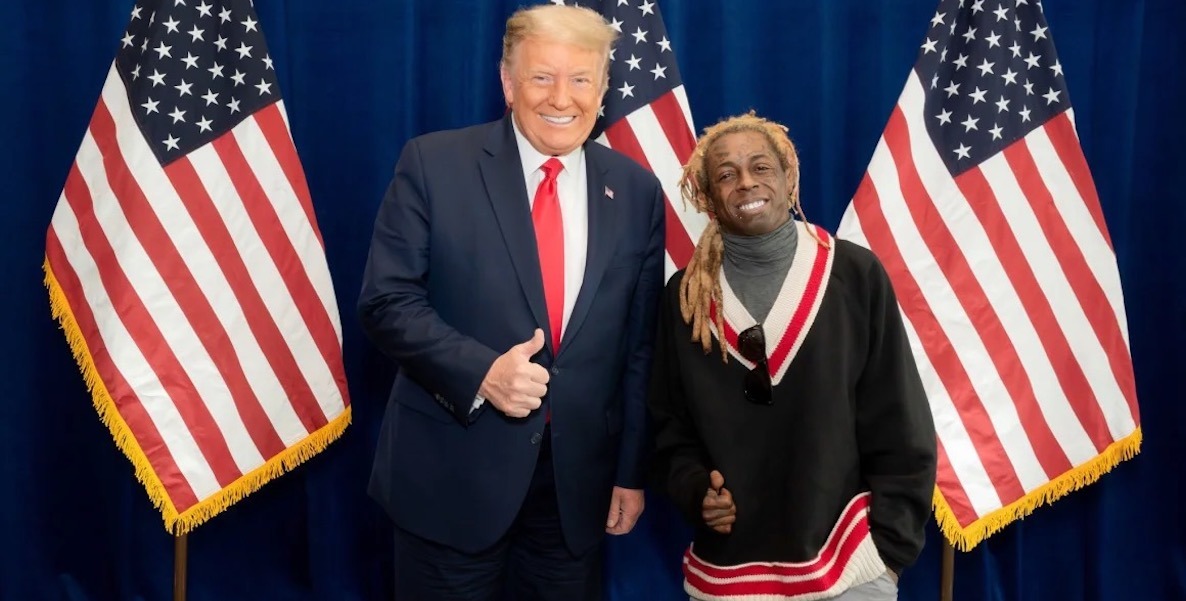Rappers are liars. They lie almost as much as Donald Trump lies. Trump lies in every speech he gives, in every interview he conducts, and in every soundbite you see from him on the internet or social media.
The kind of lies rappers tell are mostly performative. They serve a purpose: to project an avatar of who they are in the world. This is where concepts like “bling” come from, where hyper-masculinity finds its home, and where the materialism and misogyny of rap music and hip-hop culture live their best lives. Trump’s lies project an avatar as well. He is, in the words of Lupe Fiasco’s ominous narrator in “Put You On Game,” “the Trusted Misleader.”
Rappers have been referencing Donald Trump in their lyrics since at least 1989 with the Beastie Boys’ “Johnny Ryall.” Scarface’s “Money and Power” (1991) and Jay-Z’s “What More Can I Say” (1998) follow suit — largely alluding to Trump as a brand, a powerful symbol of wealth and monetary success. In these allusions, rappers name-check Trump like a commodity, a signifier to which listeners can easily relate. The late Mac Miller’s “Donald Trump” (2011) presents Trump as the paragon of wealth along with all of the autonomy that being wealthy in capitalist society grants to the uber-rich. Rae Sremmurd’s “Up Like Trump” (2014) is yet another entry in this laundry list of lyrical allusions to Trump that laud his wealth and popularity — two things that most rappers covet and boast about — whether they have it or not.
All of this allusive energy predates former President Trump’s initial campaign for president in 2015. After 2015, things changed. In Kendrick Lamar’s “Black Friday” (2015), he suggests that anyone would be better off voting for Trump than “play[ing]” with him.” Given what we know about Trump’s term as president and what we’ve witnessed between K.Dot and Drake this year, this “Black Friday” line might be the most serious reference any rapper has ever made to Donald Trump.
The people who love Trump’s persona … also love the idea that these Black rap caricatures represent all Black people.
In 2016, YG & (the late) Nipsy Hustle’s “FDT” (i.e., Fuck Donald Trump) became an anthem. Even other rappers took up the chant in their live shows. In Rick Ross’ “Free Enterprise” (2016), Ross quips: “assassinate Trump like I’m Zimmerman.” This hits differently, given the recent assassination attempts, but the line will always resonate in the context of George Michael Zimmerman’s killing of Trayvon Martin and the (still) unbearable fact that he was never held accountable for it.
This shift — from mentioning Trump as a successful icon to calling him out as the political fraud that he is — was both swift and incisive. Rappers lie a lot, but they also have to keep it real.
Rappers + Trump = business
The lies in rappers’ lyrics are like the lies Zora Neale Hurston talks about in her extraordinary anthropological excavation of Black stories. We don’t know who any of these artists really are. You don’t know who Kanye West is, who Lil Wayne is, who Sexy Red is, or who Kodak Black is. What you know about them are the lies they tell about their own lives.
After Trump’s ascension to the Oval Office, the relationship between rappers and the former President took another turn. Kanye West, in his MAGA hat, openly endorsed Donald Trump when he visited the White House in 2018. In 2020, Lil Wayne publicly endorsed Trump, posting a picture with him on social media and praising his work on criminal justice reform. Wayne highlighted Trump’s Platinum Plan, aimed at economic empowerment in Black communities. Note well here that in January 2021, Lil Wayne was granted a pardon by Trump after pleading guilty to federal weapons charges. Trump also pardoned Kodak Black in 2021 when he was serving time for a federal firearms offense.
It might have always been this way, but certainly during his presidency, for many rappers, their relationship with Trump was transactional. They serve as avatars for Trumpism, and he pardons them and / or produces headlines for their brands.
Rappers lie because lying is central to what makes rap the art form that it is: The braggadocio, the exaggeration, and the hyper-masculinity are all pillars of an artform that has gone global over the past 50 years. Trump’s lies, however, are not the same. He lies to distort reality — not the fictional reality of the blinged-out worlds of rap culture and hip-hop, but our political reality.
The marriage between Trump’s lies and the lies of rappers has found purchase (once again) in the 2024 electoral cycle. There’s a long history of interaction between Trump and rappers, and it’s worth considering the pathological connections between rappers who endorse Trump and the transactional nature of those endorsements.

Kanye West is probably the most famous rapper to endorse Trump. He donned a MAGA hat and said slavery was a choice. He dined with Trump and white supremacist Nick Fuentes at Mar-a-Lago. These acts reinforce the lie that rappers represent Black people who endorse Trump. West’s lies about MAGA and slavery land like the performative acts of a rapper grappling with diminishing returns on his outrageous career. These lies are impossible to take seriously. The idea that slavery was a choice is as absurd as West’s claim that he would run for president himself.
However, the transactional nature of these endorsements cannot be ignored. Trump pardoned Kodak Black. He pardoned Lil Wayne. His relationship with rappers has been purely transactional.
Avatars of Trumpism
When you see rappers from the drill music scene endorsing Trump, understand that they serve as avatars for Trumpism in distinct ways.
First, they represent the pathological way in which Trump’s MAGA world understands Black identity. Two drill rappers from New York stood on stage and endorsed Trump, leaving many people wondering why. The answer is that they were facing 140 indictments. The “smart” move for them was to curry favor with Trump in hopes of securing a pardon. It might only cost them 2 million dollars directed to Rudy Giuliani to be pardoned for their crimes.
In this context, rappers endorsing Trump is an ominous transaction, but there are deeper reasons for this relationship that extend beyond the lies and the pardons.
The people who love Trump’s persona — the White guys who love MAGA; the ones invested in Trumpism; the ones who love drill music and gangster rap; the ones who love the misogyny, materialism and violence — especially when it reflects the pathological proclivities that some rappers glorify, also love the idea that these Black rap caricatures represent all Black people.
The dragon energy that Kanye West shares with Trump, and the atavistic avatars who endorse Trump, all serve the same purpose: Their goal is to burn down the world we live in for their own personal gain.
Rap music, especially gangster rap in all its iterations, feeds the very stereotypes through which White men see Black culture. Sexxy Red fits the Jezebel stereotype that White men project onto Black women. Kodak Black embodies the single-story stereotype that uneducated young White men see when they look at Black men. For them, Trump sharing the stage with these rappers — who glorify misogyny, violence and drug dealing — is a valuable exchange. These rappers fit perfectly into the ethos of Trumpism. They reflect the Trumpian version of Black identity. This relationship between rappers and Trumpism is disturbingly arranged.
These rappers are avatars of Trumpism.
Another important point in this exchange is the outrageous nature of the things they say. The untrustworthy nature of their endorsements presents potent media opportunities for Trump. In Trumpism, no press is bad press, and for many of these rappers, the same holds true. Headlines translate into streams, which translate into dollars. Social media controversy becomes compensation. For them, it’s valuable and worth it.
At the end of the day, these endorsements matter about as much as any regular celebrity endorsement does. Unless it’s Taylor Swift or Beyoncé or Oprah, celebrity endorsements do not actually move the political needle. These rappers, for the most part, do not reflect large swaths of the Black community. But the headlines turn into revenue and increase their likes (or dislikes).
For most of us, rappers who endorse Trump only serve as avatars of Trumpism. And many of these avatars are atavistic. They point to a certain synergy that Kanye West articulated in his endorsement of Trump. According to West, they both share a certain kind of “dragon energy.” Now, I’m not sure how Kanye interprets dragon energy, but the dragons I know — from Game of Thrones, from Tolkien lore — are fickle creatures. They are powerful, and they do not care about human beings. At the end of the day, they use their power to exploit and destroy humans and their institutions with reckless abandon.
This dragon energy that Kanye West shares with Trump, and the atavistic avatars who endorse Trump, all serve the same purpose: Their goal is to burn down the world we live in for their own personal gain.
![]() MORE FROM JAMES PETERSON
MORE FROM JAMES PETERSON





